Rachel Manija Brown's Blog, page 2
October 15, 2025
My favorite winter holiday is upon us!
Yuletide signups are open!
Here's the tagset showing what's eligible to request and offer.
What intrigues you in the tag set? And who plans to participate this year?
 comments
comments
Here's the tagset showing what's eligible to request and offer.
What intrigues you in the tag set? And who plans to participate this year?
 comments
comments
Published on October 15, 2025 13:21
Dear Yuletide Writer,
Thank you for writing for me! If you have any questions, please check with the mods. I am a very easy recipient and will be delighted with whatever you write for me. I have no special requirements beyond what's specifically stated in my DNWs. I'm fine with all POVs (i.e., first, second, third), tenses, ratings, story lengths, etc.
My AO3 name is Edonohana. I am open to treats. Very open. I love them.
This year I have gone for a slate of obscure-even-for-Yuletide canons plus a few less obscure canons with obscure-even-for-Yuletide characters. Some of my prompts are longer than others, but I want everything equally.
I like hurt-comfort, action/adventure, horror, domestic life, worldbuilding, evocative descriptions, camaraderie, loyalty, trauma recovery, difficult choices, survival situations, mysterious places and weird alien technology, food, plants, animals, landscape, X-Men type powers, learning to love again or trust again or enjoy life again, miniature things or beings, magic, strange rituals, unknowable things, epistolary fiction, found footage/art/creepy movies/etc, canon divergence AUs anf alternate versions of characters. I particularly love deadly/horrifying yet weirdly beautiful settings, especially if there's elements of space/time/reality warping as well. And many other things, too, of course! That list is just in case something sparks an idea.
( General DNWs )
( Crossroad - Barbara Hambly )
( Earthsea - Ursula K. Le Guin )
( Fire Dancer Series - Ann Maxwell )
( Ki and Vandien Quartet - Megan Lindholm )
( The Last Hot Time - John M. Ford )
( Lyra - Patricia Wrede )
 comments
comments
My AO3 name is Edonohana. I am open to treats. Very open. I love them.
This year I have gone for a slate of obscure-even-for-Yuletide canons plus a few less obscure canons with obscure-even-for-Yuletide characters. Some of my prompts are longer than others, but I want everything equally.
I like hurt-comfort, action/adventure, horror, domestic life, worldbuilding, evocative descriptions, camaraderie, loyalty, trauma recovery, difficult choices, survival situations, mysterious places and weird alien technology, food, plants, animals, landscape, X-Men type powers, learning to love again or trust again or enjoy life again, miniature things or beings, magic, strange rituals, unknowable things, epistolary fiction, found footage/art/creepy movies/etc, canon divergence AUs anf alternate versions of characters. I particularly love deadly/horrifying yet weirdly beautiful settings, especially if there's elements of space/time/reality warping as well. And many other things, too, of course! That list is just in case something sparks an idea.
( General DNWs )
( Crossroad - Barbara Hambly )
( Earthsea - Ursula K. Le Guin )
( Fire Dancer Series - Ann Maxwell )
( Ki and Vandien Quartet - Megan Lindholm )
( The Last Hot Time - John M. Ford )
( Lyra - Patricia Wrede )
 comments
comments
Published on October 15, 2025 13:02
October 14, 2025
Into the Raging Sea: 33 Mariners, One Megastorm, and the Sinking of El Faro, by Rachel Slade
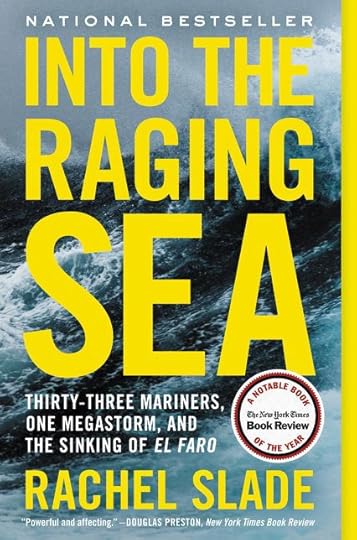
This is an outstanding work of narrative nonfiction about the sinking of the merchant marine ship El Faro, with no survivors, on October 1, 2015. As far as anyone could tell initially, the captain inexplicably sailed the ship straight into the eye of Hurricane Joaquin, which he definitely knew was there.
Then the black box got retrieved. It had the complete audio recordings of everything that happened on the ship for 26 hours before it sank, right up to its final moments. Rachel Slade, a journalist, used the complete audio plus in-depth interviews with everyone who could possibly have any light to shed on the matter to write the book. She not only gives an analysis of what happened and why, she covers all the surrounding circumstances that led to it. It's an outstanding work of nonfiction disaster reporting that often reads like a suspense novel, it will teach you a lot about many things, and it will make you very angry.
The culprit, essentially, was capitalism. A company called TOTE took over the original company that owned the ship and put a business bro who knew nothing about shipping in charge. He fired a bunch of people at random on the theory that there were too many employees, and slashed maintenance because it was expensive. Everyone who was experienced, skilled, and not desperate who hadn't already been fired quit, leaving only people who were inexperienced, unskilled, undesirable for other reasons, desperate, or in low-level positions where they had no influence on general operations, on a ship in serious need of repairs and upgrades. TOTE put enormous pressure on the captain to get the ship to its destination on time, no matter what, to save money. Finally, there were multiple sources for weather reports, the one which was most current was more complicated to use, and not everyone understood that the other source could be nine hours behind.
The captain had been investigated for sexual harassment, had a history of poor judgment calls, and had the social skills of Captain Ahab; because of this, he knew he was on thin ice and if he got fired from the El Faro, he might not get another job as captain. The second mate was a young woman trying to make it in a men's world who had reported him for harassing her, and dealt by avoiding him as much as possible. The entire crew was operating under a system where the captain was basically God. The only way to contact the outside world, like if for instance a crew member wanted to report that the captain was set on sailing them into a hurricane, was a satellite phone that only the captain had access to.
Basically everyone but the captain was worried they'd sail into the hurricane, the captain was worried he'd get fired if he took the long way around to avoid the hurricane and didn't realize that his weather reports were not up to date, everyone was tiptoeing around or avoiding the captain because he was a giant asshole who was also the God-King, and no one had any way to overrule or go around him.
The culture of "never question the captain even if he's obviously wrong" has caused a number of plane crashes, and the aviation world responded by instituting a system of training to teach crew members to speak up forcefully if they think the captain is making a mistake, complete with exactly how to phrase it. If you're interested in this, it's called Cockpit/Crew Resource Management (CRM); the podcast "Black Box Down" has a number of episodes involving it.
CRM would have been helpful for the El Faro, as would giving the crew private access to the satellite phone or some other way of reporting on the captain. And, of course, so would not allowing companies to put workers in extremely unsafe conditions. Regulations are written in blood. Worse, the blood can spill and nothing gets written at all.
An excellent book. I recommend it to anyone with an interest in disasters, survival, or the failure mode of capitalism.
 comments
comments
Published on October 14, 2025 12:59
October 13, 2025
Sleeping Giants, by Sylvain Neuvel
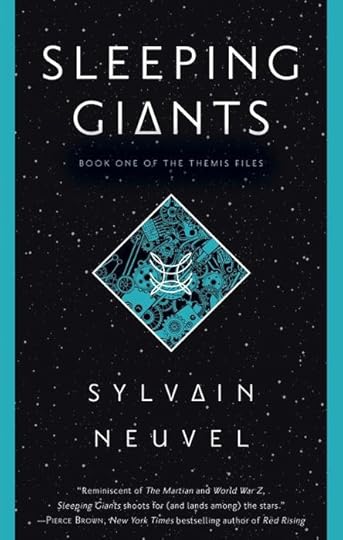
This book contains several elements which I like very much: it's epistolatory, it has mysterious ancient sophisticated machinery, and it involves very big size differences. I love miniature things and people, but I also love giants and giant things. This novel is entirely in the form of interviews, and it begins with a young girl walking in the woods who falls into a sinkhole, and lands in the palm of a GIANT HAND. (I can't believe that image isn't on the cover, because it's so striking and is also by far the best part of the book.) The gigantic hand is metal, and it turns out that there are pieces of a complete ancient giant robot scattered all over the world! What happens when the whole giant robot is assembled?
It turns out that what happens is yet another example of a great idea making a bad book, largely - AGAIN - by failing to engage with the premise! WHY IS THIS SO COMMON????
To be fair, this book has many bad elements which do not involve failing to lean into its premise.
The entire book consists of interviews by an unnamed, very mysterious person with near-infinite money and power. He is hiring people to locate the robot parts, assemble them, and pilot it. He also conducts personal interviews with them in which he pries into their love lives in a bizarrely personal manner. It's clearly because the author wanted to have a love story (he shouldn't have, it's terrible) and figured this was the only way to do it and keep the format, but it makes no sense. The interviewers do object to this line of questioning, but not in the way that I kept wanting them to, which would have been along the lines of "Don't you have anything better to do than get wank material from your employees? Drop it, or I'll go to HR."
The girl who fell into the hand grows up to be a physicist who gets hired to... I forget what exactly, but it didn't make much sense even when I was reading it. Anyway, she's on the project. There's also a badass female helicopter pilot, and a male linguist to translate the mysterious giant robot inscriptions. All these people are the biggest geniuses ever but are also total idiots. All the women are incredibly "man writing women."
Most annoyingly, the robot does not seem to be sentient, does not communicate, does not have a personality, and only walks for like 30 seconds once.
Spoilers! ( Read more... )
I feel stupider for having read this book.
It's a trilogy but even people who liked the first book say the returns steadily diminish.
I normally don't think it's cool to criticize people's appearances, but in this case, this dude chose to go with this supremely tryhard author photo.
 comments
comments
Published on October 13, 2025 14:06
October 1, 2025
Out of Air, by Rachel Reiss
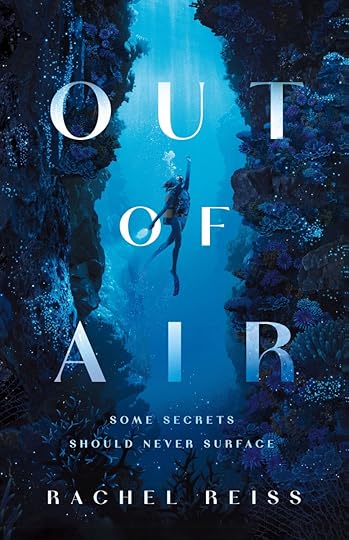
Just in terms of the premise, this is The Secret History meets Shadow Divers: a poor girl scuba diver falls in with a group of rich kid scuba divers, and they end up bound together by a shared deadly secret. There's other works it also reminded of, again just in terms of the premise, which are more spoilery: ( Read more... )
In the present timeline, Phoebe aka "Phibs," a poor aspiring underwater photographer, discovers a hidden underwater cave while on a diving trip with her four rich best friends, Gabriel (hot boy she likes), Will (Gabriel's fraternal twin, a joker), Lani (lost three fingers in past timeline, now afraid to dive), and Isabel (Lani's girlfriend). That is all the characterization Phibs's friends get, though Phibs herself gets a little bit more, or at least more backstory: she's the sole caretaker of her grandmother with dementia, and the women in her family have a possibly uncanny knack for finding things.
In the past timeline, Phibs finds five gold coins via the family knack, and something happens that led to Lani losing fingers and someone dying. In the present, Phibs finds a beautiful underwater cave with an air pocket. She and Gabriel rest and kiss in the air pocket... and then learn that there's a legend saying bad things happen to people who breathe the air in the cave. It seems to be true, as deeply creepy things begin happening to their bodies...
The plot and premise are great, and the diving and body horror/transformation scenes are really well-done. Reiss is a professional scuba diver, and you can tell. But the pacing feels a bit abrupt and choppy, which is not helped by the dual timelines cutting between the past and present, so that events that actually are set up still sometimes feel like they come out of the blue. I had a hard time figuring out the geography of anywhere that wasn't underwater, which is not a common complaint I have about books - for instance, I wasn't sure for most of the book whether the island base in the present storyline was a tiny island with only one house on it, or a large one with a town. And of course there's the mostly-nonexistent characterization, which is really the biggest problem with the book. If this had actual characters rather than "hot boy" and "Lani's girlfriend," it would have been so good.
I didn't mind that nothing is explained about what's actually up with the cave and Phibs's family knack, but in case you would mind: nothing is explained. I did enjoy reading the book but more attention to character and taking things slower could have made it excellent rather than just an enjoyable read with some standout elements.
 comments
comments
Published on October 01, 2025 07:22
September 30, 2025
The Bewitching & Mexican Gothic, by Silvia Moreno-Garcia
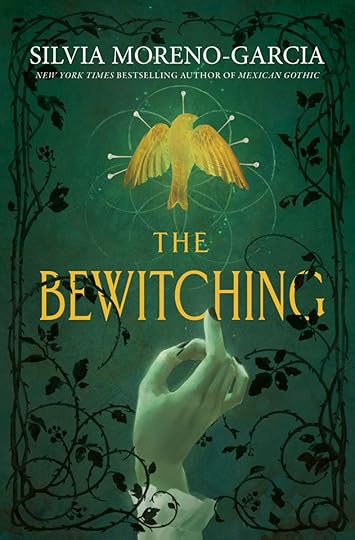
Three timelines intertwine, connected by witches and women. A grad student in Massachusetts in the 1990s, whose grandmother had a run-in with a witch in the early 1900s in Mexico, researches the mysterious disappearance of a promising woman horror writer in the 1930s.
It's a very nicely constructed, gripping, enjoyable novel of good and evil magic, and women's persistence in the face of what seem to be impossible odds.
Content notes: Cat death.
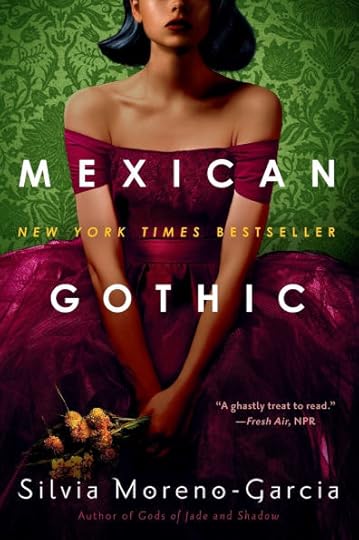
What it says on the tin: a very gothic-y gothic, set in Mexico. Noemi is a bit of a shallow, selfish debutante in 1950s Mexico. But when she realizes that her cousin who married a wealthy older man may be in trouble in their lavish home in rural Mexico, Noemi sets out to rescue her. She promptly encounters every gothic trope ever, plus a really fun twist on the haunted house/ghost story.
It turns out that being a mean girl debutante used to getting her own way is exactly what's needed to survive this story. I had no end of fun with Noemi bluntly calling out the rule about no talking at dinner, demanding to know exactly what medical treatment her cousin was getting, and generally running roughshod over the creepy atmosphere. A very enjoyable book that I read in a single sitting.
 comments
comments
Published on September 30, 2025 14:47
September 9, 2025
We Live Here Now, by Sarah Pinborough
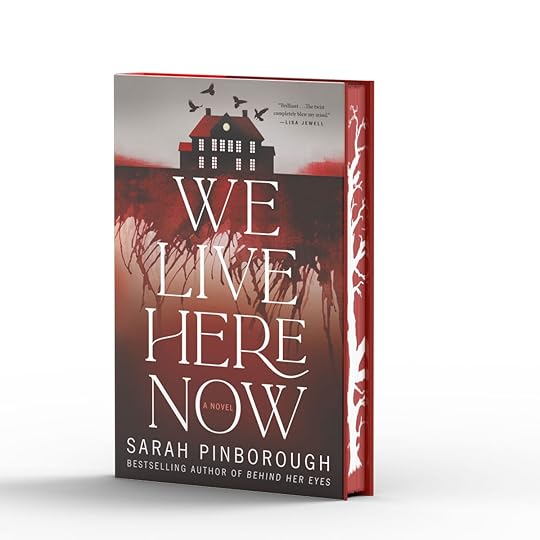
This novel appears to be a well-written and enjoyable but conventional haunted house story; it turns out to have a twist on that theme which I've never encountered before. I very much enjoyed discovering that for myself, so if you think you might too, don't read the spoilers.
A young couple, Emily and Freddie, move from London to Larkin Lodge, an old house in Dartmoor, while Emily's recovering from a serious accident. After she fell off a cliff, her heart stopped and one leg was permanently damaged. Doctors warned her and Freddie that she might suffer from post-sepsis mental complications, so when she starts perceiving weird things involving Larkin Lodge, both she and Freddie think it's probably her, not the house. Emily and Freddie's marriage is not the greatest, but is that something that was previously going on, or is it cracking under stress, or is the house having a bad effect on them?
Emily and Freddie are not the best people, but that really works for the story. I thought it was a lot of fun.
Spoilers! ( Read more... )
Content notes: Not even slightly gory or gross. Mention of a miscarriage (off-page, not described). Some violence, not graphic. No on-page animal harm, but the body of a dead raven is found.
 comments
comments
Published on September 09, 2025 09:54
September 2, 2025
Hemlock & Silver, by T. Kingfisher
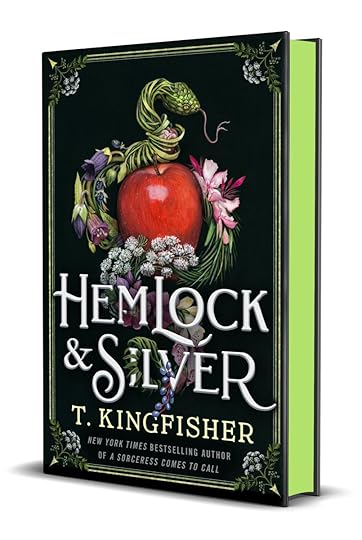
After disliking both The Hollow Places and The Seventh Bride by T. Kingfisher, and for similar reasons (idiot heroine who refused to believe in magic when it was happening right in front of her; annoying tone), I gave up on her works. But since lots of my customers like her, I ordered this book. And when it arrived, it was so beautiful that I had to pick it up and examine it. And then I figured I'd read a couple pages, just to get an idea of what it was about. Those couple pages quickly turned into the first chapter. Then the second. The next thing I knew, I was actually enjoying the book, and finished it with great pleasure.
Anja is a scientist specializing in poisons and antidotes, who regularly takes small doses of poison to understand their effects and test out antidotes. She saves the lives of poisoned people, sometimes. This gets her enough fame that one day the king shows up, asking her to save his daughter, Snow, who he believes is being poisoned...
This is a very loose retelling of "Snow White," making clever use of elements like the apple, the mirror, and the poison.
Like the other books of hers I read, this one is set in an unambiguously magical world and/or has a portal to an unambiguously magical world, and has a heroine who doesn't believe in magic. I guess this is an obligatory Kingfisher thing? At least in this one, Anja doesn't deny that things are happening when they're clearly happening, she just thinks that maybe there is some underlying scientific explanation. This makes at least some sense, as she's a scientist. (Though in my opinion, science is basically a framework and a worldview, and a scientist in a magical world would be doing experiments to figure out how magic works, not denying its existence.) In any case, Anja does not act like an idiot or a flat earther, but pursues the clues she finds and doesn't deny what they suggest. She's kind of monomaniacal, but in a fun way.
Hemlock & Silver meshes multiple genres. It's not a horror novel or even particularly dark for a fantasy, but it has some genuinely scary moments. It's often very funny. And one aspect of the story, while technically fantasy, is so methodically worked out and involves so much science (optics) that it feels like science fiction. There's also a murder mystery, a romance, a surprisingly agreeable rooster, and a talking cat. It all works together quite nicely.
 comments
comments
Published on September 02, 2025 09:49
September 1, 2025
Labor Day Book Poll
Published on September 01, 2025 13:12
August 25, 2025
Fic in a Box Letter
Full letter to come!
Thank you for writing for me! If you have any questions, please check with the mods. I am a very easy recipient and will be delighted with whatever you write for me. I have no special requirements beyond what's specifically stated in my DNWs. I'm fine with all POVs (i.e., first, second, third), tenses, ratings, story lengths, etc.
My AO3 name is Edonohana. I am open to treats. Very open. I love them.
I like hurt-comfort, action/adventure, horror, domestic life, worldbuilding, evocative descriptions, camaraderie, loyalty, trauma recovery, difficult choices, survival situations, mysterious places and weird alien technology, food, plants, animals, landscape, X-Men type powers, learning to love again or trust again or enjoy life again, miniature things or beings, magic, strange rituals, unknowable things, epistolary fiction, found footage/art/creepy movies/etc, canon divergence AUs anf alternate versions of characters. And many other things, too, of course! That list is just in case something sparks an idea.
( Opt-in Tags )
( General DNWs )
( Caught in Crystal - Patricia Wrede )
( Dark Tower - Stephen King )
( Dragonriders of Pern - Anne McCaffrey )
( Marvel 616 )
( Piranesi - Susanna Clarke )
( The Stand - Stephen King )
 comments
comments
Thank you for writing for me! If you have any questions, please check with the mods. I am a very easy recipient and will be delighted with whatever you write for me. I have no special requirements beyond what's specifically stated in my DNWs. I'm fine with all POVs (i.e., first, second, third), tenses, ratings, story lengths, etc.
My AO3 name is Edonohana. I am open to treats. Very open. I love them.
I like hurt-comfort, action/adventure, horror, domestic life, worldbuilding, evocative descriptions, camaraderie, loyalty, trauma recovery, difficult choices, survival situations, mysterious places and weird alien technology, food, plants, animals, landscape, X-Men type powers, learning to love again or trust again or enjoy life again, miniature things or beings, magic, strange rituals, unknowable things, epistolary fiction, found footage/art/creepy movies/etc, canon divergence AUs anf alternate versions of characters. And many other things, too, of course! That list is just in case something sparks an idea.
( Opt-in Tags )
( General DNWs )
( Caught in Crystal - Patricia Wrede )
( Dark Tower - Stephen King )
( Dragonriders of Pern - Anne McCaffrey )
( Marvel 616 )
( Piranesi - Susanna Clarke )
( The Stand - Stephen King )
 comments
comments
Published on August 25, 2025 12:14

 comments
comments


